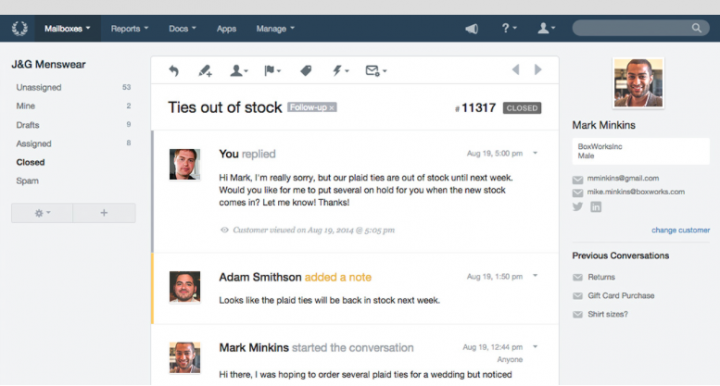Your business can’t exist in a vacuum. Whether your customers are the type to leave a nasty review when an app crashes, blog about their favorite digital tools, or retweet brands on Twitter, people are talking about your business online.
And even though an irate customer tweet can be enough to wreck your afternoon, that feedback can also be extremely valuable. According to a Forrester study commissioned by Dell, companies that launch “listening and digital engagement initiatives” are rewarded with improved customer satisfaction scores and greater loyalty. Not only that, but the feedback your customers provide can also help you improve your core product or service.
Still, the constant stream of feedback can be a little overwhelming if you don’t have processes in place to filter and respond to comments and questions. Here are a few ideas for listening to what your customers have to say (without letting them take over your life).
1. Call Joe With Your Morning Joe
Start your morning by picking up the phone and calling a customer. I know — it’s pretty low-tech, but it’s extremely effective. I do this every day, and it’s become a habit.
Take notes on your conversations, and record your feedback in one place. After a while, you’ll have a repository of information that you can use to pull out common themes and high-opportunity areas of improvement. You’ll also build rapport with customers by reaching out personally.
Just be considerate of customers’ time. Five to 15 minutes is enough to get the information you need and thank the customer for his feedback.
2. Start a Virtual Help Desk
Tools like Help Scout allow you to funnel all your customer feedback to one spot. You can respond to customer questions and problems, assign customer questions to other team members, log phone calls, and tag customer conversations for easy reference.
3. Follow Social Dialogue
Regularly reviewing social dialogue is key. Use advanced Twitter searches to monitor what’s being said about your company, or try a tool such as mention to get alerts when people are discussing your company on the web.
Log interactions in a spreadsheet, and set a calendar reminder to review feedback on a regular basis. Then, identify changes that need to be made in response to that feedback.
Netflix did an amazing job of responding to customer sentiment in 2011 when it announced that it was going to split its streaming and DVD rental services. Netflix received so much backlash from customers that it ultimately decided not to pursue the split.
That said, be careful about outliers. A vocal minority may not be who you need to listen to; sometimes, your customers are simply wrong. It’s important to take criticism seriously, but to also consider the broader context of the feedback.
4. Discover What’s Trending
It’s important to pay attention to what your customers are paying attention to. What are they tweeting about? Which conferences are they going to? Where do they spend their money? Listening isn’t just about asking questions and dissecting customer feedback. Learning about your customers’ behaviors and emerging trends is just as important.
Whatever You Do, Keep It Personal and Honest
Whatever system you put in place, always keep customer interactions personal. You should never outsource customer support to someone else. (Nothing says “I don’t care” like a customer service representative who clearly has nothing to do with your company or an automated response.) Even if you do have an in-house support team, you should still spend some time answering customers’ questions yourself.
Take in what they have to say, try to resolve their issues, but don’t make any promises you can’t keep. Back in 2007, a company named Sigg made claims that its water bottles were BPA-free in response to customer feedback, but it later came out that its bottles had trace amounts of BPA up until August 2008. Making an empty claim to appease customers is the fastest way to destroy the loyalty and trust you’ve worked hard to build.
Listening to customers is the smartest thing for your business because it grounds your strategy in real-world insights. How you handle customer feedback is just as important to your company’s success as the products you build or the services you provide. But don’t just stop at listening and responding to feedback; you should take action on common themes and use customer insights to implement changes that will improve your business.
About the Author:
 Wade Foster is the co-founder and CEO of Zapier, a service that makes it easy to move data among all your web apps to automate tedious tasks. Wade is also an entrepreneur-in-residence for Office Depot’s SmallBizClub.Connect with him on Twitter.
Wade Foster is the co-founder and CEO of Zapier, a service that makes it easy to move data among all your web apps to automate tedious tasks. Wade is also an entrepreneur-in-residence for Office Depot’s SmallBizClub.Connect with him on Twitter.










